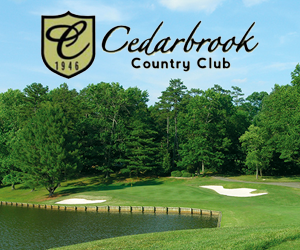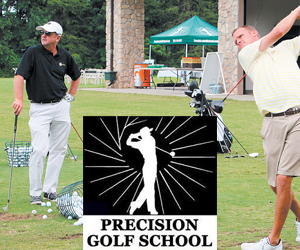Young High Point golfer remembered for spirit, courage
By STEVE HANF
HIGH POINT – When Glenn Heer learned in the spring that a bone marrow donor had been found and he’d be on his way to a normal life following a transplant, he cut short his freshman year of college to prepare for the procedure.
Before leaving North Carolina, though, Heer had a message for Tar Heels golf coach John Inman: “I told my golf coach when I came back I was going to be 6-5, 250, and he said, ‘I’ll hold a scholarship for you,’ ” a smiling Heer said in May.
Those big dreams for the 4-foot-10 High Point Central graduate never materialized. Heer, responding remarkably well to his treatments at the National Institutes of Health in Bethesda, Md., died suddenly on July 14. He was 19 years old.
Inman and his wife, along with UNC assistant coach Don Hill and five members of the Tar Heel golf team, made the trip to High Point Friends Meeting for Heer’s memorial service. Heer had served as manager of the team during his freshman year and also played his way onto UNC’s highly competitive club squad.
“We wanted to represent the UNC golf team because he was a big part of us,” Inman said. “They loved him – Glenn was their guy. His energy, that spirit of his, they loved having him around and Glenn loved being around them.”
Heer spent countless days of his life in hospitals battling an immunodeficiency disorder that, when he was just 2, claimed the life of his 5-year-old sister, Cassie. The mysterious nature of the disease would baffle physicians for years, and Heer became a one-of-a-kind case study at the NIH. At one point, his immune system turned on his own body and caused disfigurement to the left side of Heer’s face. He stopped growing at the age of 11.
Undaunted by his disease, Heer set about enjoying life as much as – and in truth, much more than – any “normal” kid. He enjoyed deer hunting and fishing. He loved baseball in general and the Boston Red Sox in particular. At the age of 13, he became the youngest Eagle Scout in Troop 20 history, having amassed 55 merit badges and been named Brotherhood member of the Order of the Arrow.
Nowhere, however, did Heer feel more at ease than on the golf course. Prior to his freshman year at High Point Central, he approached coach Kim Stalnaker about playing for the Bison. There wasn’t much the coach could say: Heer couldn’t hit it far, didn’t seem to stand a chance to compete for a high school team.
But that was a minor challenge compared to everything else Heer faced. He played and practiced every chance he got. Blair Park Golf Course became a second home. By his junior year, Heer was contributing counting scores during Central’s spring matches. As a senior, he would follow up his short drives with pinpoint iron shots to the green, becoming an all-conference performer and qualifying as an individual for the state 4-A regional.
Heer even managed to visit a course to do some putting and chipping while recovering from his transplant in Maryland. Doctors finally nailed down his ultra-rare condition – Severe Combined Immune Deficiency: Recombinant Activation Gene 1 (SCID RAG 1) – and found that a bone marrow transplant could replace Heer’s malfunctioning immune system with one that worked. Eighteen months later, the 10 out of 10 marrow donor match was found, setting in motion the June transplant.
His mother, Candy, said Glenn responded to the procedure better than doctors had hoped, “the poster boy” for the transplant. The night before he died, mother and son spent a normal evening watching the Major League Baseball All-Star Game while doing some stretching exercises – Greg Norman golf stretches, no less. He was feeling fine, enjoying the recent decorations added to his room in the apartment where he and Candy were living during his recovery.
The next morning, Candy went in to wake her son and he was feverish and unresponsive. He never regained consciousness.
“Talking to Glenn, texting Glenn, he was ready to go tear up the world,” Stalnaker said. “Glenn beat everything, and then to have this happen after the surgery and Glenn doesn’t wake up – it’s so unfair.
“Glenn was always at the doctor: ‘He’s all right, he’ll be back tomorrow,’ ” the coach added of people’s reactions to the news. “Everybody just can’t believe it.”
At the celebration of Heer’s life, the memorial bulletin had a photo of a golf bag and clubs set on a background of green grass and blue sky. Heer’s personal bag, the large Bison headcover standing watch over the large crowd, stood at the front of the church.
Stories of Heer’s life flowed freely during the service and after, from his hole-in-one at Blair Park, to his desire to continue playing a round even as snow began to fall, to the mischief he occasionally got into while being a kid just like any other.
Inman, who first met Heer at a UNC golf camp, recalled the friendship struck up between camper and 6-foot-8 Tar Heel Phillip Chauncey. Their jokes escalated over the days until Heer finally devised the ultimate plan: putting BBQ sauce, ketchup and mustard all over Chauncey’s truck out in the parking lot.
Just one problem — Heer decorated the wrong Tahoe. But it did belong to a UNC athlete – a football player.
“He ended up having to clean the car off in the baking sun,” Inman recalled with a laugh at the memory.
Really, that took as much courage as anything else Heer did in his life. It would have been easy to retreat in the face of his disease, worry about how far he was being out-driven on the golf course, wallow in self-pity because of his differences. But the only word mentioned more than “golf” at Heer’s memorial service was “courage,” a quality Glenn had enough of to fill every lake and bunker on every golf course ever designed.
Survived by his parents Mike and Candy Heer of High Point, Glenn Heer was an organ donor and also donated his body to the NIH to further its fight against immunodeficiency diseases. En lieu of flowers at his memorial service, the family requested gifts in Glenn’s memory be sent to: The Immune Deficiency Foundation, P.O. Box 758695, Baltimore, Md., 21275; Brenner Children’s Hospital, 10th Floor Ardmore Tower, WFU Baptist Medical Center, Medical Center Blvd., Winston-Salem, NC 27157; or The Children’s Inn at the NIH, 7 West Drive, Bethesda, Md., 20814-1509.
















